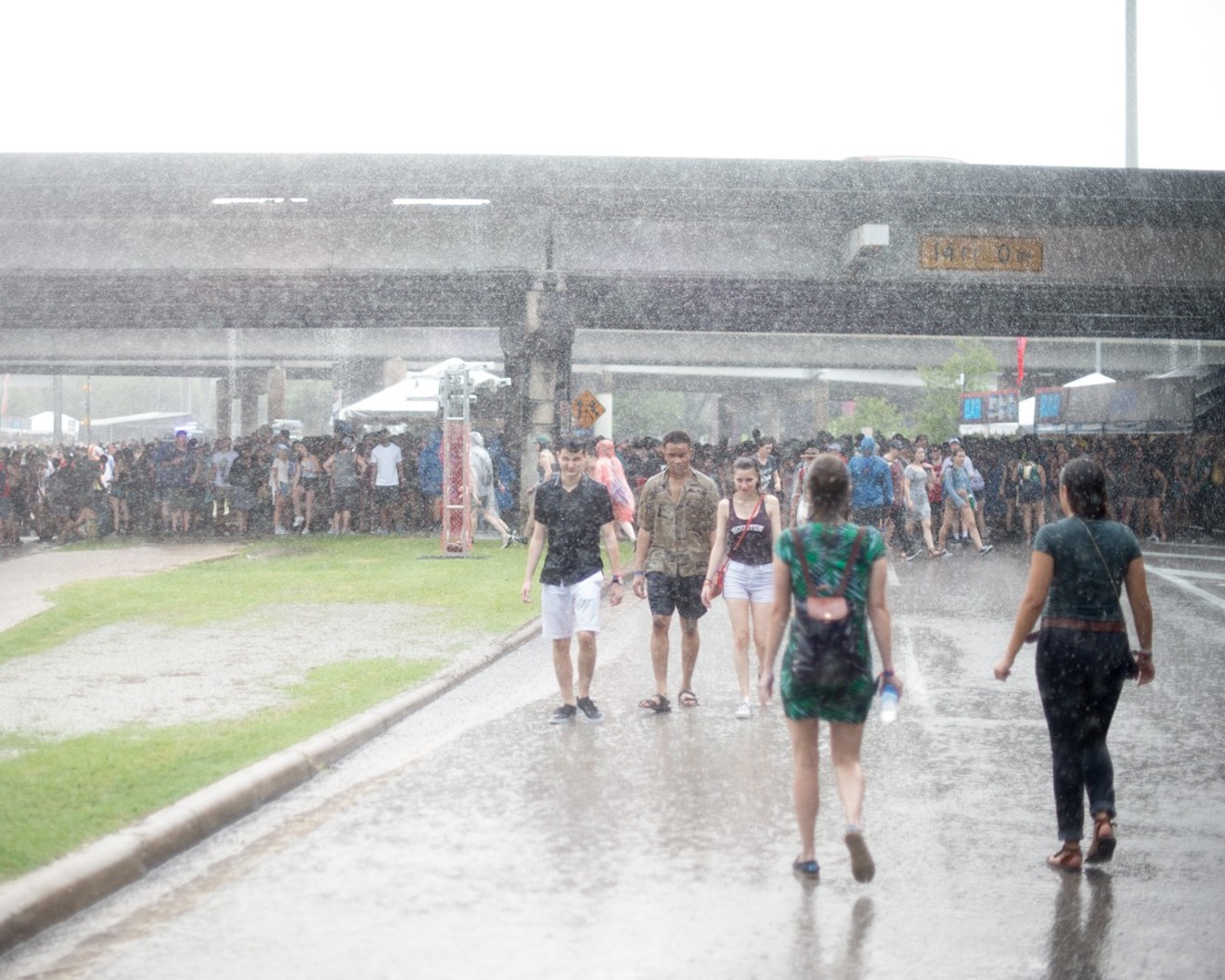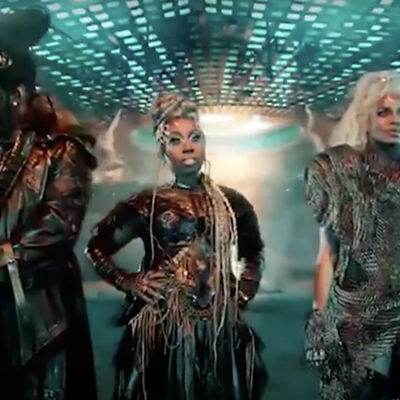Of course it’s not just the weather; sometimes these festivals also shoot themselves in the foot by booking some pretty dubious headliners, for example. But we know it’s possible for Houston to pull off a first-class outdoor music fest — witness the throngs of people, A-list regional acts and stellar word of mouth surrounding downtown’s Super Bowl LIVE earlier this year — but does it really have to take years of planning, relentless marketing and millions of dollars (not to mention a major sporting event attached) in order to make it happen?
So that’s what we asked our Music folk: What is it with Houston and outdoor festivals? What needs to happen for things to get better? Or should Bayou City music fans looking for a great festival just resign themselves to endless road trips to Jazz Fest and ACL?
************
The problem with Houston is that it lacks an overall feel in terms of local flair. For instance, Austin has the whole “live music capital of the world” thing going for it, which isn’t really true, but hey, branding is branding. New Orleans is a jazz hub. Other festivals have found their niche. Houston, meanwhile, seems to kinda throw everything at the wall and hopes something sticks. Open Air Fest? Sure, why not pay tribute to all things metal? Free Press Summer Fest? Yeah, let’s pick a few pop and EDM acts and cater to high-school and college kids. The tricky part is, I’m not even entirely sure what a popular, successful music festival in Houston would even look like, but it would probably lean heavy on hip-hop and rock, as is the case for festivals like ACL, Coachella and Voodoo Fest. Point being, if Houston wants its own must-see music festival, organizers have to shell out for the big acts that draw fans, and the fans have to pay to show up. So far, those two things seem to have trouble coexisting. And, oh yeah, the weather in Houston can kindly be labeled unpredictable, so planning a can’t-miss outdoor music festival is damn near impossible. CLINT HALE
************
Houston doesn’t have a festival problem, it has a weather/shelter/location problem. Let’s face it, there have been plenty of successful multi-day festivals here in the Bayou City. From the beloved street-closure block parties of the '80s and '90s like Westheimer Arts Festival (and the Bob Marley Festival) to Art Car Parades and various holiday events across town, plenty of festival-type celebrations have occurred with success. The only difference between the events I mention here and, say, FPSF or Houston Open Air is that the former were (or are) overwhelmingly locally produced events and the latter aren’t (anymore). What difference does that make? People like tradition and knowing what to expect. Having a festival in the same place year after year made by locals who understand our culture, its people and the weather patterns just makes sense.
We’re certainly not at a loss for space in H-Town; we just need to double down on more predictable weather seasons (news flash: Summer is wet here) and utilize spaces we already have. There are plenty of places in Houston that traveling festivals can use. But visitors to our city must divorce themselves from the idea that all festivals must occur completely outside. We have lots of indoor spaces that could accommodate multiple stages. Or try an indoor/outdoor festival with, say, the George R. Brown and Disco Green. NRG Park has indoor/outdoor facilities; even Cynthia Woods is still an option, though the traffic-ridden drive will likely cost any festival planner ticket sales. (Personally, I have plenty of friends who outright shun the venue no matter who is performing.) There’s no reason for festivals to fail here if they’ve got some contingency planning that doesn’t default to evacuation. Sure, severe weather happens, but if festivals had an indoor option for shelter, we wouldn’t be writing this, would we? KRISTY LOYE
************
When Governor's Ball canceled the third day of its festival in 2016 because of lightning, no one blamed New York City. So why is it that every time a local festival finds itself under water, literally or figuratively, people love to blame Houston? Indicting our city's lousy and at times dangerous weather may be satisfying, but it doesn't get to the heart of why our festivals don't succeed. If you must point fingers, perhaps they should land on whoever planned a festival at the start of hurricane season? Or perhaps on whoever slapped together those haphazard evacuation plans? Houston's weather is irregular, but predictably so. Festival organizers need to buy themselves a goddamn Farmer's Almanac and stop pretending like next year is going to be better. If they don't, each festival is a roll of the dice that risks much greater tragedy than a handful of angry fans. It's time for the festival powers that be to start shifting around the concert calendar and developing bolder, more innovative safety plans. KATIE SULLIVAN
************
Unless someone new, someone not associated with FPSF, comes into the market, Houston will never have a Tier 1 – think Coachella, Lollapalooza or Bonnaroo – music festival. Whether you believe this is a good thing or a bad thing is largely a matter of perspective.
With FPSF's move to the C3 family of events, its growth will always be limited because the company doesn't really need two major festivals in the same state. ACL is the big dog of the Texas festival scene, and C3 isn't going to undercut the costs of its major, in-state destination festival when it can make plenty of money running a mid-level, teen-focused festival right as soon as school comes to a close for summer. Just because grown folks don't get/like what FPSF has become doesn't mean that it's not still a license to print money provided the weather plays nice. Put up some stages, get a DJ or two, convince one of the headliners from Governor's Ball to come down, and kids will show up, rain be damned.
So, yes, if you live in Houston and you're hoping the city becomes home to some sort of mega-festival, you'll need to hope that someone else wants to get in on the action here. But it's not as if Houston isn't already home to a destination festival. Sure, Day For Night's footprint is smaller, but its lineups are more interesting and it's easily the most visually interesting festival not only in the state, but maybe in the entire country.
Texas weather will always make anything outdoors a crapshoot, from Friday night football to music festivals across the state. But no city that is home to a fest like Day For Night can really be considered to be cursed. And hey, the mere existence of FPSF means we're, at the very least, a step ahead of Dallas in the festival game. CORY GARCIA
************
Things do go right for Houston and music festivals, just not everything goes right. As much as people complain about them, we have some of the best festivals in the region. Sure, weather has caused issues with a handful of them in the past couple of years (Something Wicked ’15, FPSF, Houston Open Air), but that has been a common factor with events all over the country. Music fans in the Houston area are actually kind of spoiled in comparison to those in other regions around the nation.
The festival scene has improved. Middlelands and Day For Night were both incredible successes, and are considered game-changers at the national level because of their unique and innovative approaches. A few short years ago, FPSF was the crown jewel of Houston music festivals. The art installations, lineup, location and the fact that it was the only midsize festival in the region made it a potential travel spot for concertgoers. Expanding it to three days was also discussed, but those thoughts flowed down Buffalo Bayou after several editions of poor weather and repeat lineups. Additionally, FPSF seemed to lose its identity as the local flair disappeared with the Live Nation buyout; this seems to be a theme with several other festivals that the company has taken over.
There are advantages to having a large organization take over; however, corporations are not synonymous with hip, alternative festival culture. The investment in traveling to a festival is much larger than in attending one in your backyard. This makes the reasons to attend more important and they include a combination of factors such as location, lineup, theme, art and sense of community. There is a saturation of festivals with extremely similar lineups and amenities, and carbon-copy events do not get people excited about traveling.
With that said, Houston is a worthy and deserving town for the best festivals. The city has an infrastructure to host them along with many music fans to support the events. To keep the dollars flowing, the promoters need to give the fans what they want or they will begin to travel more. JACK GORMAN









